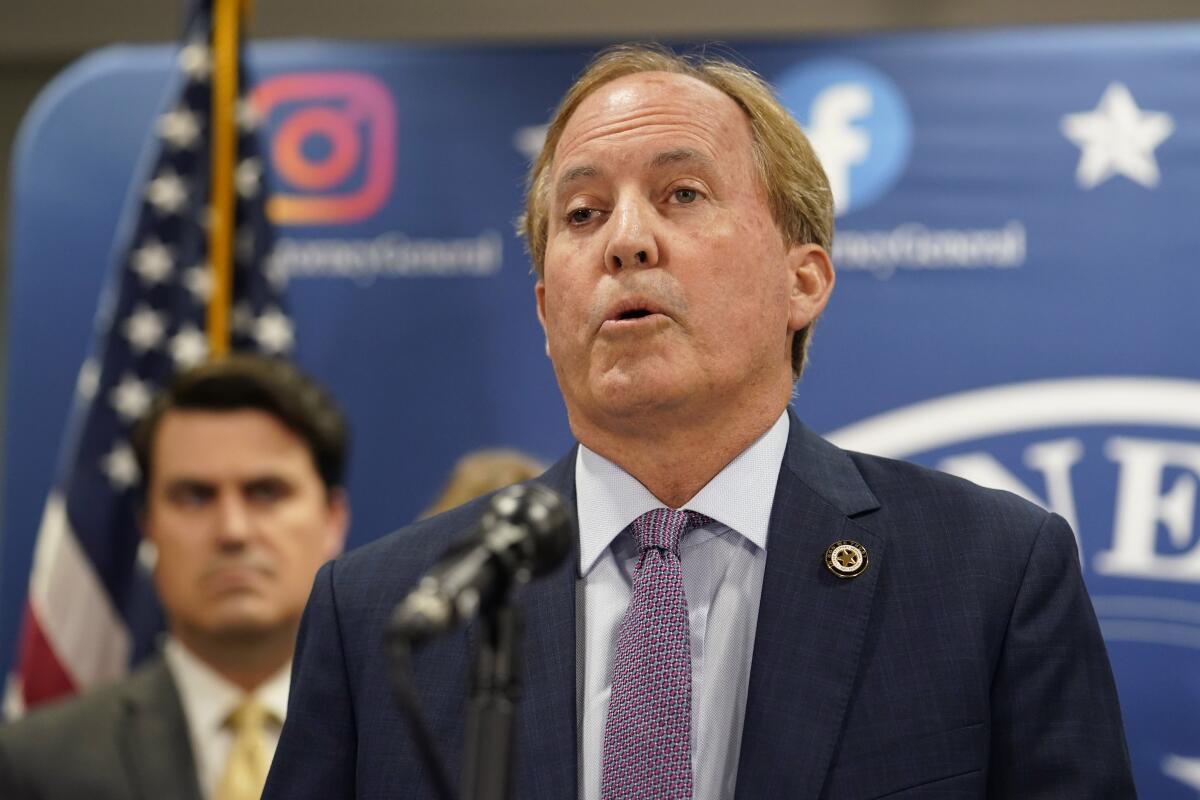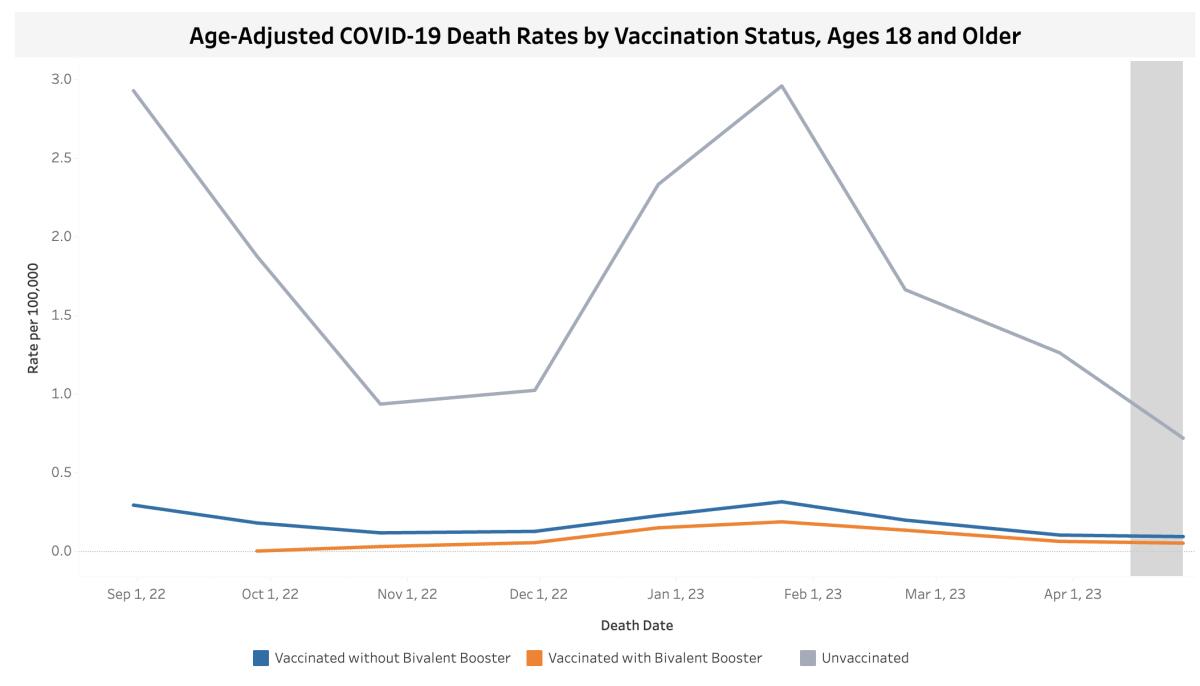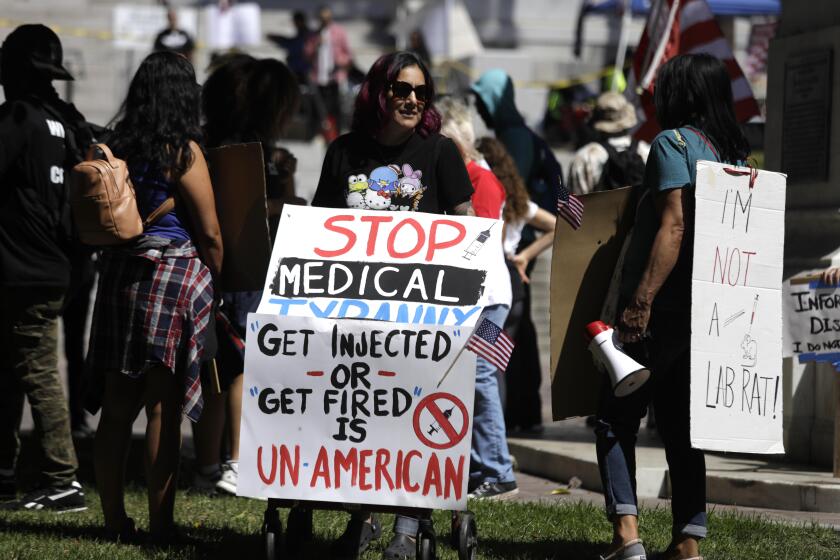A bogus new attack on COVID vaccines from Texas’ least credible politician

- Share via
In recent times, whenever a government lawsuit swears at common sense, at the facts and at the public interest, it has been a safe bet that Texas Atty. Gen. Ken Paxton has his fingerprints on it.
Sure enough, here comes Paxton with a lawsuit charging Pfizer Inc. with systematically misrepresenting the efficacy of its COVID-19 vaccine and attempting to censor public discussion about it.
“The COVID vaccines are the miracle that wasn’t,” Paxton states in the very first line of the lawsuit, filed Nov. 30 in state court in Lubbock. “Placing their trust in Pfizer, hundreds of millions of Americans lined up to receive the vaccine.... However, the pandemic did not end; it got worse.”
Get the latest from Michael Hiltzik
Commentary on economics and more from a Pulitzer Prize winner.
You may occasionally receive promotional content from the Los Angeles Times.
There’s a lot of misinformation and disinformation packed into the 54 pages of Paxton’s legal complaint, some of it so nonsensical as to evoke laughter, starting with the fact that the reasons the pandemic got worse after the introduction of COVID vaccines had more to do with policies promoted by Paxton and his political cronies than with Pfizer.
But let’s quickly dispose with the underlying theme of Paxton’s lawsuit, which is that the vaccines don’t work.
The COVID vaccines are the miracle that wasn’t.
— Texas Atty. Gen. Ken Paxton
The Health and Human Services Department of the State of Texas itself refutes that assertion. Its website documents that at every stage of the pandemic and among every age group, vaccinated Texans experienced massively lower death rates from COVID than the unvaccinated.
In late January 2022, during the devastating Omicron wave, for instance, the COVID death rate in Texas was nearly 805 per 100,000 residents among the unvaccinated. Among those who had received the recently released bivalent booster vaccine, it was zero. In late April, the latest period surveyed, the death rate among the unvaccinated was 23 per 100,000; among the fully vaccinated it was 1.83.
Those figures match the findings of countless other studies of the vaccines’ effectiveness. A year ago, after the vaccines had been available for two years, the Commonwealth Fund calculated that they had prevented more than 18.5 million hospitalizations and more than 3 million deaths in the U.S. That saved the U.S. about $1.15 trillion in healthcare costs that would otherwise have been incurred, the fund estimated.
What’s Paxton’s purpose in challenging this reality? It would take a triumph of metaphysics to pry into his soul, but it’s fair to conjecture that he’s trying to maintain his extreme right-wing cred after his near-career-death experience in September. That’s when his Republican colleagues in the state Senate narrowly acquitted him of the corruption and bribery charges on which he had been impeached by the Republican-controlled Texas house in May.
You can’t say that Paxton doesn’t know his audience. Polls show that Republicans, self-identified conservatives and the less educated have all been overrepresented among vaccine resisters, in part because of campaigns against vaccines and vaccine mandates promoted by politicians such as Paxton.
In July 2021, when the Biden administration was trying to impose a vaccine mandate on employees of the federal government and of federal contractors, Paxton was quoted responding, “Not on my watch!” That October, he sued to block the mandates.

In general terms, Paxton’s claim that the vaccines are ineffective, even dangerous, dovetails neatly with themes parroted falsely by such luminaries of the extreme right as Arizona’s Kari Lake, Sen. Ron Johnson (R-Wis.) and Florida Surgeon General Joseph Ladapo — all of which have been conclusively refuted.
These claims are no laughing matter, however. They undermine confidence in vaccines against all vaccine-preventable diseases — measles and polio, among others — threatening the health of tens of millions of children and adults.
Paxton’s immediate target is Pfizer, but his broader targets are the mRNA vaccines developed by Pfizer and Moderna, which are the leading COVID vaccines in the U.S. and much of the rest of the developed world.
He also takes shots at the Food and Drug Administration, suggesting that the FDA improperly approved the vaccines for distribution. It should be remembered that the FDA, America’s premier regulator of drugs and medical devices, has long been a target of anti-regulation conservatives, including Johnson.
So let’s take a closer look at Paxton’s case.
At its heart is a ginned-up controversy over Pfizer’s claim that its COVID vaccine is 95% effective against COVID. Paxton complains that that’s a measure of the vaccine’s reduction of “relative risk,” when it should be citing “absolute risk.”
Hiltzik: Scientists are paying a huge personal price in the lonely fight against anti-vaxxers
The anti-vaccination and anti-science movements are killing thousands of innocent people. Why don’t government agencies and professional groups speak up?
These are abstruse notions for laypersons, so here’s an explanation. (Beth Mole of Ars Technica, a microbiologist, is very good on this topic.) Put simply, when risk is fairly low, absolute risk calculations yield low numbers. Anti-vaxxers like that, because it minimizes the perception of a vaccine’s efficacy. Relative risk, however, arguably provides a better window into a treatment’s effectiveness.
For its key clinical trial of its COVID vaccine in November 2020, Pfizer divided test subjects into two groups of about 17,500 people each. One group got the vaccine, the other got a placebo. None had shown evidence of a prior COVID infection.
Of the placebo group, 162 of the 17,511 subjects got COVID. Only eight of the 17,411 members of the vaccinated group got COVID. The relative risk calculation is 162 minus eight, divided by 162 and expressed as a percentage. That answers the question of how much less is a vaccinated person likely to contract COVID than an unvaccinated subject, and the answer is 95% less.
Absolute risk is much lower, because the original risk is fairly low — of the vaccinated group, 0.046% got COVID; of the unvaccinated group, about 0.9% did.
Paxton’s argument is that Pfizer should have claimed only a 0.86% risk reduction rate. But that’s absurd. As Mole points out, the absolute risk of an infectious disease can vary widely based on circumstance. “A person’s absolute risk of flu drops significantly when it’s not flu season,” she writes. The absolute risk of COVID declined precipitately during lockdowns, and rose when people went out into the world again.
The question relevant for vaccines is how they worked for different people in the same situation — and that’s relative risk. Pfizer’s figures suggested that for everyone in a lockdown, the vaccine would reduce the severity of infection by 95%; the same for everyone out in the world.
Paxton asserts that Pfizer’s 95% claim “created the false impression that 95% of vaccine recipients would never obtain COVID-19, full stop.”
DeSantis and his crackpot surgeon general attack COVID vaccination with misinformation, cherry-picked data and lies. They’re a menace to public health as long as they have jobs.
If that’s so, it’s a flaw in our system of scientific reporting, perhaps because journalists writing about these results didn’t know the significance of relative versus absolute risk reduction. But it was certainly well understood in the scientific community and at the FDA, which had all the data at hand and knows how to do the math.
Paxton also advances a long-debunked claim that the COVID vaccines actually increase the likelihood of contracting the disease. His argument here rises from a combination of sheer ignorance — if not deliberate misrepresentation — and flagrant cherry-picking.
One of his sources is a post that appeared on an online contrarian website last year and was widely reprinted, but that grossly misinterpreted an article in the New England Journal of Medicine about the effect of vaccination on children.
The post claimed that the NEJM article showed that vaccination increased children’s susceptibility to COVID, but that was wrong, as the author of the NEJM article made clear. In fact, the article showed only that the immunity conferred by the vaccine waned over time, which pointed to the conclusion not that vaccines are a health hazard for children, but just the opposite — that they should receive booster vaccines.
Paxton’s second source is a study of COVID death rates in Scotland that, he says, “demonstrate negative vaccine efficacy.” For example, the data show that the age-adjusted death rate from COVID in the third week of December 2021 was 1.69 per 100,000 among the unvaccinated, but 6.55 per 100,00 among those with two doses of vaccine.
That’s true, but incomplete. In that week, the age-adjusted death rate among those with a booster or three doses was 0.33. And by the second week of January 2022, the rate among the unvaccinated was 10.4 per 100,000, but for those with booster shots or three doses it was only 1.5. In other words, Scotland’s survey irrefutably demonstrated that the vaccines worked, not the opposite.
The danger in Paxton’s campaign against Pfizer is that it only amplifies anti-vaccination sentiment that is spreading alarmingly around the country, especially in red states and conservative communities.
Vaccination is the quintessential medical intervention that benefits not only the vaccinated individuals but all those around them — family, friends, co-workers and employees of the services that can’t avoid contact with others. It’s the sine qua non of public-spirited medical options, and it’s our shame and misfortune that it has been redefined by the Paxtons of this world as a strictly personal choice.
More to Read
Get the latest from Michael Hiltzik
Commentary on economics and more from a Pulitzer Prize winner.
You may occasionally receive promotional content from the Los Angeles Times.













